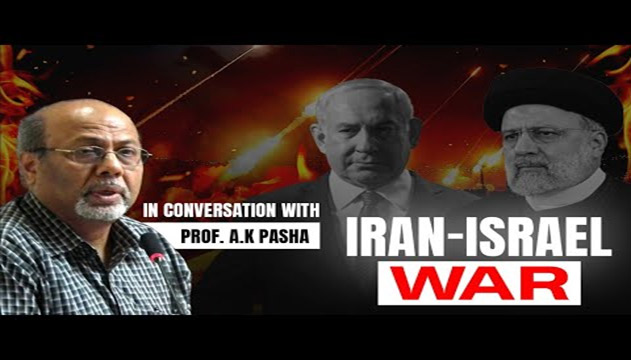The podcast episode titled “JNU Prof. Aftab Kamal Pasha on Iran-Israel War” was hosted by Forum For Global Studies, a Delhi based multidisciplinary thinktank. Dr Sandeep Tripathi moderated the session and the talk featured Prof. Aftab Kamal Pasha, a noted West Asia Expert from JNU. The discussion focused on the Israel-Iran conflict’s complexities and its global implications.
Dr Tripathi opened the discussion by introducing Prof. Aftab Pasha, Director of Gulf Studies Program, Centre for West Asian Studies, School of International Studies, Jawaharlal Nehru University. The podcast opened with an insightful overview of the historical animosity between Israel and Palestine and how it affects the global dynamics. Dr Tripathi expressed his concerns over the ongoing Israel-Palestine war and the possibility of it escalating in the 3rd World War. Supporting his stance, Prof. Pasha walked through a brief history of Israel-Palestine enmity and how the tensions escalated between two nations, leading to a full-blown war. He mentioned the role of Israel’s right-wing government and their stance on the entire Palestinian territory including Gaza and West Bank being a part of Israel, in further intensifying the animosity.
Later on, Prof. Pasha talked about the ‘Hamas’ group, and the attack launched by them on Israel. He articulated their opposition to the alleged genocide of Palestinians by Israel and called for a ceasefire. Prof. Pasha mentioned the role of ‘Houthis’ and ‘Hezbollah’ in support of Palestinians and the retaliation by the USA and UK. He also talked about other non-state actors from Iran, in favor of Palestine. He also talked about Iran’s strategic agreement with Syria, creation of Hezbollah, civil war Of Yemen highlighting the role of Iran in maintaining its influence in the Middle East. Prof. Pasha explained the linkages of Hezbollah, Houthis and Hamas with Iran, citing a possibility of a proxy war between the USA and Iran.
Furthermore, Prof. Pasha explained the ‘Kurds Day’ and its significance as a revolt against Israeli forces. He talked about the Israel-Iran conflict which further exacerbated the tensions. Professor Pasha expressed concern about the Israel-Palestine conflict potentially escalating into a global conflict, involving regional powers as well as countries like the USA, UK, Europe, and Egypt, each playing their roles against the Iran-China-Russia axis. He also addressed the concern of Iran attacking 14 US bases in 7 Gulf Cooperation Countries (GCC), if there is any attack on territory of Iran either by Israel or its allies. Prof. Pasha highlighted the issue of energy insecurity and inflation in the global market as a result of the ongoing war, citing the large volumes of oil and gas flowing through this region. He further cited the concern over the possibility of Israel-Palestine war escalating into the 3rd World War depending upon its leadership and upcoming upheavals. Both the scholars discussed the concerns of global political upheavals and their direct impact on the global economy and raised the significance of economic instability over the armed conflicts. Prof. Pasha mentioned the depreciating stance of the dollar against other currencies in relation to the oil trade, leading to weakening of the USA’s global influence. At the end of the podcast, Dr Tripathi questioned India’s position in the ongoing conflict, also the challenges and opportunities it opens for India, with its 85% energy dependency on the region. Addressing the concerns, Prof. Pasha suggested the importance of diversifying its energy imports to maintain stability and sustain its energy needs.

